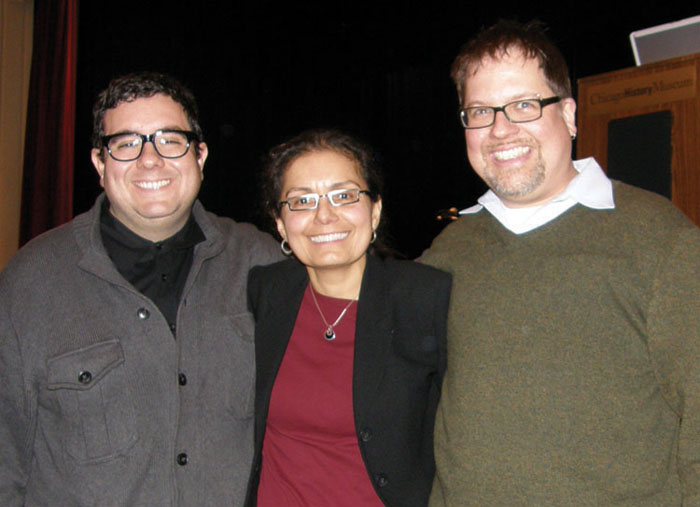The Chicago History Museum’s Out at CHM series hosted its first Latina/o event March 4. Titled “Queer Latinos: Art and Change,” the program showcased the work of two researchers, Lourdes Torres and Lawrence La Fountain-Stokes who presented on their Chicago-based work in the Latino/a community. They were introduced by Ramon Rivera-Servera, an assistant professor in the department of performance studies at Northwestern University.

Torres is a professor of Latin American and Latino Studies and the director of the Center for Latino Research at DePaul University, and a board member of Amigas Latinas, a local organization for Latina lesbian, bisexual, transgender, queer and questioning women. Torres’ presentation was on Amigas and on its predecessor group, LLENA. She said that the impetus behind her work was to “document the efforts of Latina lesbians to define their identity in public spaces” as they worked to “negotiate national and ethnic identities and the diverse political histories” of members.
LLENA began in 1988 and lasted till 1992. Chicago, in 1980, was not a friendly space for Latina lesbians, who saw a lack of public spaces. In November 1988, more than 30 such lesbians gathered for a meeting to discuss ways to remedy the situation, and this gave birth to Llena. The name was an acronym for “Latina lesbians en nuestro ambiente” or “Latina lesbians in our space.” “Llena” in Spanish also means “full.” According to one member, LLENA was to convey the sense that the women felt “perfect in our own space [ with ] a sense of completeness.” The group met every other Friday at Horizons, now Howard Brown Health Center.
Llena consisted of a mixture of all social classes, including professors and undocumented women, and the ages ranged from their 20s to their 60s. The bilingual meetings were described as chaotic and intense, and lasted as long as four hours. According to members, they always felt unwelcome at Horizons, where the staff were mostly white gay men who made them feel out of place. They were not allowed in if they came early and had to stand waiting outside in the cold. Eventually, José Lopez, executive director of the Puerto Rican Cultural Center, offered them that space and Llena moved its meetings there.
The group began putting out a bilingual newsletter, Lesbiana, in 1990. Torres said that its politics fit with the general trend towards a Third World feminist movement. According to Torres, LLENA’s politics were coalitional and intersectional; one of its main co-sponsored events was the immensely popular International Women’s Day Dance. The group eventually disbanded in 1992, but by then it had made its mark in establishing the need and the hunger for a public space for Latina lesbians, paving the way for Amigas.
By the 1990s, Chicago was a more welcoming place for Latinas and there was a proliferation of organizations and events for women of color. These included Affinity (for African-American lesbians) and the WACT (Women of All Colors Together) potlucks. Evette Cardona was among the co-founders of the latter, and she would become one of the co-founders of Amigas Latinas in 1995.
Torres pointed out that Amigas, which continues to this day, is unique for being one of the few that has sustained itself for more than a decade where most do not survive beyond two years. The group is currently a non-profit with over 300 members. Among the reasons for its success is that Amigas has become a leading educator and advocate for Latina lesbian issues and is explicit about the fact that Latinas are not a monolithic group; it also addresses the needs of youth, older women and families. In that it echoes the words of a LLENA newsletter: “We must work towards an inclusive community as well as a pluralistic feminism.”
La Fountain-Stokes, an associate professor of Latina/o studies, American Culture and Spanish at the University of Michigan, spoke about five queer Latina/o artists and writers based in Chicago: writer Achy Obejas, poet Rane Arroyo, director Rose Troche, Teatro Luna co-founder Coya Paz and performance artist Faust Fernos” of Feast of Fun. La Fountain-Stokes presented biographical sketches all five, showing how each recorded and negotiated complex issues of self and cultural identification as Latina/o in a city that is multiethnic and often strewn with tensions around race and ethnicity. Troche is most famous for her 1994 breakout hit film Go Fish, about a multiethnic group of lesbians living in the then-not-yet-completely gentrified Wicker Park. According to La Fountain-Stokes, Troche made a film that cannot be easily read as Latina unless viewers notice subtle references to her Puerto Rican heritage. He pointed out that most biographies and media pieces on the filmmaker downplay her ethnic identity. Quoting the scholar Lisa Henderson, he said that the film instead portrays a “modest lesbian utopia.”
The question-and-answer session evoked praise and additional bits of ongoing Chicago Latina/o history. Cardona added that ALMA (the Association of Latino Men for Action) had been instrumental in helping to form Amigas. She also pointed to the existence of contemporary Latina/o groups like Dulce Palabras, a queer spoken-word ensemble.